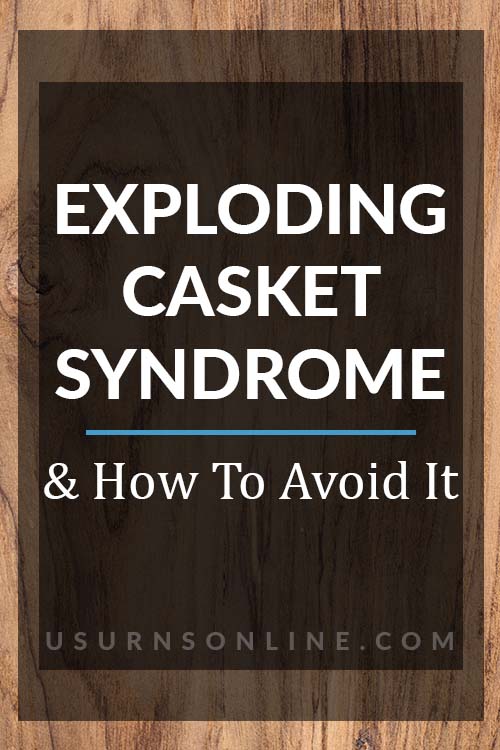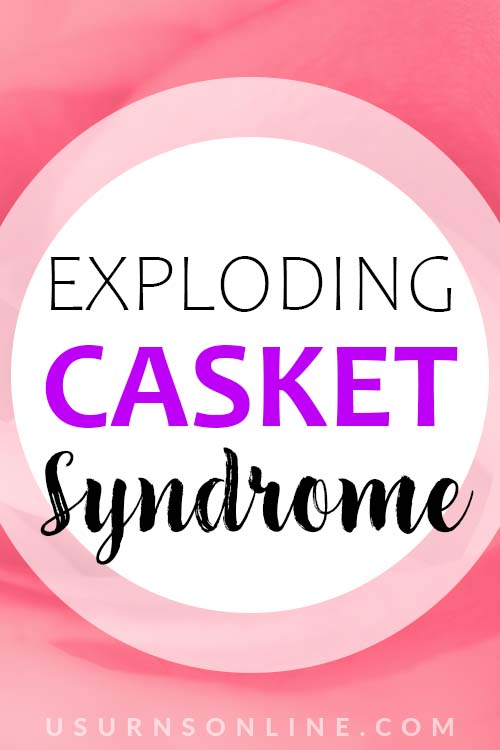Death will find all of us at some point along the way. It’s natural to be curious about what happens in the process of dying and after death.
One of the most bizarre concerns about the modern funeral process is truly weird: Exploding Casket Syndrome.
When you first hear this, the initial thought is “That’s totally fake.” But unfortunately (and quite interestingly)… it’s not.
Caskets really can explode. It’s not pleasant to think about – after all, we all want to “Rest In Peace.” The idea of your own or a loved one’s casket blowing up is not a comforting thought.
But you’re here and want to learn about it, so let’s dive in.
What is exploding casket syndrome? Does it happen often? What causes it? And how can we avoid it? Read on to learn all about this strange phenomenon.
Our website is supported by our users. We sometimes earn a commission when you click through the affiliate links on our website. See our privacy policy & disclosures for more information.
What Is Exploding Casket Syndrome?
Exploding Casket Syndrome is the funeral industry’s term for an overly-sealed casket that bursts open to allow gases from bodily decomposition to escape.
It might be best to keep in mind that “Exploding Casket Syndrome” does not necessarily mean a casket literally explodes. It might be as small as a seam opening, or the lid may develop a slight separation. It’s just enough of a gap that the casket will pop open at the weakened area.
But yes, it can also mean the casket does explode. Either way, it will cause a mess.
Urns Made in the USA
What causes the casket to explode?
A casket explodes or bursts when the body’s decomposition doesn’t have enough space to complete the entire process.
As the body breaks down, it creates gases and fluids that must have room to be released. If there is no room, the casket will explode: as mentioned above, a seam could split, the lid may develop a minor breach, or it can blow off entirely.
Does the body explode in the casket?
Unembalmed or poorly embalmed bodies have exploded in caskets. With nowhere to go, the body may swell up from the gases and liquids of decomposition. Eventually that pressure will have to be released.
How to Avoid Having Your Casket Explode
Are there ways to ensure the casket doesn’t explode? Read below to find out.
1. Don’t purchase a seal on the casket
If a body is placed in a sealed casket, air can’t get in or out. The sealed casket can become an air-tight stew pot and burst from collected gases and fluids of the decaying body. Avoid a sealed casket if possible.
Many funeral directors will insist on a sealed or gasketed casket as always being the “better” choice. A sealed casket might be a good choice for “in-ground” burial but not for a mausoleum crypt.
Depending on your requirements and needs, sealed and unsealed caskets can be an essential piece of planning a funeral.
Related: Avoid These 10 Common Funeral Scams
2. Let nature take its course
Everything decomposes… eventually. Self-digestion, also called autolysis, begins shortly after death and lasts for up to four days. It starts before you can even make a phone call to the funeral home to come and pick up your loved one’s body.
Due to certain gases that are produced, the human body can bloat to double its size. At the same time, small microorganisms produce foul odors called putrefaction. At this point, the body may rupture due to the excess gas building up.
Bodily fluids are freed through the corpse’s openings. This is the beginning of active decay. Active decay will happen 10-25 days after death.
Advanced decay sets in next. This stage lasts from day 25 to 50 days after death. The eventual outcome of this stage is that the body’s bones will be exposed.
After 50 days comes the last stage of decomp. This stage is the skeletonization of the corpse. Bones, teeth, hair, and dried skin might be present. The organs, muscles, and connective tissue are all broken down at this point.
Read more about the decomposition process here.
3. Emphasize preserving your loved one’s memory
Focus on preserving your loved one’s memory instead of preserving the body. Emphasize the positive memories. Create a meaningful memorial: Build a monument to them, plant a tree, or make a donation.
Here are some ideas:
Have a headstone or grave marker made.
Upright headstone. An upright monument headstone is a tablet style gravestone. The tablet sits on a granite base. Then the headstone is set on a foundation. Upright headstones can vary drastically in shape and size. Before you purchase your upright marker, check with the cemetery to make sure you know their rules and size regulations. The average price of a headstone will run around $2000.
Flat grave marker. Flat markers are the simplest and least expensive memorial. They are usually rectangle in shape. Also called a flush marker. The average cost will be around $1000.
Slant and Pillow headstones. Slant and pillow markers sit on a concrete or granite base. Pillow markers are comparable to flat markers. The differences being the slant and pillow markers are 6-8 inches high with a slightly slanted face.
Bronze marker. A bronze marker is also a flat marker. Instead of being made of granite or marble, it’s constructed from bronze – imagine that. These markers are very common for veterans. If you or a loved one is a veteran with an honorable discharge, you will qualify for a veteran’s marker — bronze or upright. Learn more here.
Dedicate a park bench in their honor.
Contact your city or county parks department to find out what you need to do to accomplish this.
Have a small plaque attached: “In memory of” followed by the name of the person you are memorializing.
Make a donation to the deceased’s church or a special cause.
Designate what you want the money spent on.
Church donations:
- Mercy ministries
- A pew
- Bibles
- Choir robes
- Missionary work
Other causes:
- Adoption agencies
- Scholarships
- Disease awareness and research
- Mentoring programs
- Homeless shelter
4. A few more memorialization ideas
Plant a tree in their honor. By planting a tree, you are giving your loved one a memorial that can last for centuries! You will be providing shelter for animals and helping to beautify our world. Your tree will be planted in a national forest that has been ravaged by fire or destroyed by insects. This is a gift for now and future generations to come.
Donate to a charity in your loved one’s name.
- St. Jude’s Children’s Hospital
- American Cancer Society
- Unicef
- Doctors Without Borders
- Habitat for Humanity
There are never-ending lists of local and international charities to partner with. Choose one that will honor the deceased’s life and wishes.
When donating, be sure to include:
- The deceased’s name and address.
- The name and address of the closest family member.
- Your name.
It is recommended that you donate the amount that you would have spent on flowers for the funeral.
5. Choose cremation instead of casket burial
If you choose direct cremation, you will bypass most of the nastier stages of decomposition. Your funeral director will store the body in refrigeration until the cremation. With direct cremation, this might happen as quickly as 48 hours after death.
The cremation timeline can vary from state to state, and even from one funeral home to another. Your funeral director will be on top of the funeral home rules and state laws.
Learn more about the benefits of cremation over burial.
Related: How to Donate Your Body to Science
6. Can a casket explode in a mausoleum as well as underground?
Unfortunately, yes, a casket can explode in a mausoleum.
Methane gas will build up and, in some instances, blow the lid off of the casket and marble door panel off of the crypt. To put an end to exploding caskets, manufacturers have added “burpers” to sealed caskets. Burpers are gaskets that release pent-up gases by simply burping them out.
Of course, it can happen underground, too, causing the leaking of body fluids. We just can’t see it happening.
7. Choose a natural burial
Another way to avoid the exploding casket syndrome is to choose a natural burial. There is no embalming and no casket with a natural burial. Instead, you wrap the body in a shroud and place it directly into the ground.
This type of burial does not inhibit the natural decay of the human body. Men will dig the graves by hand, not using heavy equipment or machines.
Natural burial is very eco-friendly and allows you to grow flowers and other plants directly on the grave. This type of burial is allowed in any designated green burial cemetery, and many traditional cemeteries are opening sections designated for natural burial as well.
Caskets do not, as a rule, explode, and that’s a good thing. But it has been known to happen. Make sure to ask your funeral director any questions you have about “exploding casket syndrome.”
Read next: The Funeral Process, Explained by a Funeral Director
Pin It






I never heard of an exploding casket! Scares me.😱